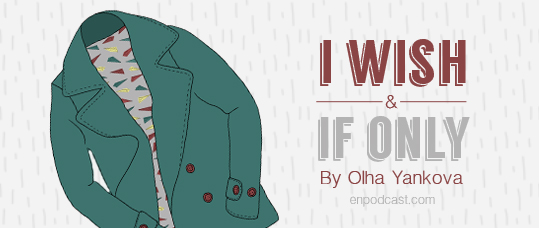I wish / If only
Adam: I wish I was wearing a jacket.
Andrii: But you wore a jacket yesterday. It was very hot and you wore a jacket.
Adam: You don't get me. I'm saying it is chilly now.
Andrii: I know it is cold. But you said: 'I was wearing a jacket'.
Adam: Well, this is all about grammar. I used 'I wish', right?
Andrii: Yes, but does it change anything?
Adam: Sure it does. You use 'I wish' and one more phrase 'If only' when you talk about your regrets, things you'd like to change about the present or the past. Like me, it is cold outside and I am wearing just a T-shirt, so I feel chilly. That's why I can say: I wish I was wearing a jacket.
Andrii: Are you speaking about present?
Adam: Yes, I am. I use Past Simple or Past Continuous after I wish or If only to speak about present regrets. For example, my friend invited me for lunch. I haven't seen her for 6 months and I really want to go but I'm busy all day long. I have a meeting. So I can say: I wish I was free today. Or If only I could meet my friend for lunch. Now you try.
Andrii: So, let's see. I really want a dog, but my girlfriend says that our apartment is too small for a dog, that's why she won't agree to buy it. So, I wish I had a dog.
Adam: That's right. And you can add something about your apartment too.
Andrii: I wish we bought a bigger apartment. Right?
Adam: No, this one is a bit different. You bought your apartment 2 years ago. In this case you are talking about past regrets. If we talk about past regrets, we need to use Past Perfect Tense (had + past participle) after I wish and If only. Try correcting your sentence.
Andrii: I wish I had bought a bigger apartment. I wish I had listened to my parents. If only I hadn't spent all my money last months. I wish I hadn't eaten so much last night.
Adam: Ok, stop, stop! That's a great deal of regrets! Are you ok, man? I wish I hadn't told you about this construction. Now you'll just keep on whining all day long just to practice your English.
Andrii: So you wish I didn't whine.
Adam: No, I wish you wouldn't whine.
Andrii: Wouldn't? But this is not Past Simple or Past Perfect. Does it mean the same?
Adam: No, I used would after I wish to say that I'd like to change something in the present. Usually it is used to speak about something annoying and we cannot change it. For example, we are supposed to be playing football now, but you got me talking about grammar and started whining about everything. I think it is annoying, so I said: “I wish you wouldn't whine.”
Andrii: Did you just call me annoying?!
Adam: Noo.... Oh, Andrii, watch out for the ball!
Andrii: Auch! It hurts so bad! I wish you had warned me earlier.
Adam: If only you hadn't distracted me with your grammar talk. Then I would have. Let's go get you some ice.
|
Remeber: I wish / If only is used to talk about present or past regrets, things that we would like to change. If we talk about present regrets, we use Past Simple and Past Continuous after I wish and If only. For example: I wish I had a job. (It means that I don't have a job) If we talk about past regrets, we use Past Perfect after I wish and If only. For example: I wish I had studied design in the university. (It means that I didn't study design) We use wish + would to talk about something in the present that we would like to change, because we find that annoying, but unfortunately we can't change it. For example: I wish you would give up smoking. (It means that you smoke, and I cannot do anything to change it.)
|
Vocabulary:
to get somebody – to understand somebody – понимать кого-то
chilly – chilly weather or places are cold enough to make you feel uncomfortable - прохладно
regret – sadness that you feel about something, especially because you wish it had not happened - сожаление
a great deal of – many – много
to whine – to complain in a sad, annoying voice about something – ныть, жаловаться
annoying – making you feel slightly angry or irritated – раздражающий, надоедливый
to be supposed to – used to say what was or is expected to happen, especially when it did not happen – быть должным, предполагться
to get someone doing something – to make someone doing something – заставить кого-то что-то делать
Watch out! – used to tell someone to be careful – осторожно!
to warn – to tell someone that something bad or dangerous may happen, so that they can avoid it or prevent itit – предупреждать
to distract – to take someone's attention away from something by making them look at or listen to something else – отвлекать
















